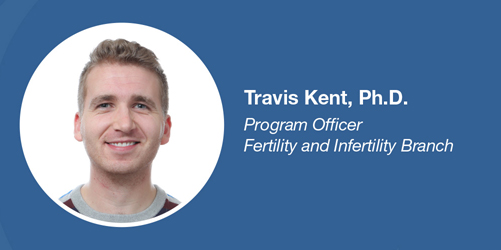How did you become interested in science and research?
 I was always interested in science as a kid, but even then, I knew I didn’t want to be a medical doctor or a veterinarian. When I was in college, I participated in a program designed to put undergraduates in the laboratory, and I fell in love with the idea of research.
I was always interested in science as a kid, but even then, I knew I didn’t want to be a medical doctor or a veterinarian. When I was in college, I participated in a program designed to put undergraduates in the laboratory, and I fell in love with the idea of research.
What brought you to NICHD?
When I was in graduate school, I knew that I did not want to be a bench scientist, and the two areas I was interested in were teaching and policy. I applied for positions in both fields and was chosen to be a part of the American Association for the Advancement of Science’s (AAAS) Science and Technology Policy Fellowship 
What types of training, experiences, or traits are essential for success in your position?
A fluency with the field you are overseeing, as a program officer, is essential to the position. Science communication (both to other scientists and to non-scientists) is also critical.
What do you find most valuable about working at NICHD?
Besides the mission of NICHD, which makes me incredibly proud to work here, I find the flexibility of this job incredibly valuable. Coming from academia, where 60-, 70-, or even 80-plus-hour work weeks are not uncommon, it is refreshing to have a strong emphasis on work-life balance.
Can you explain your job to people who are not familiar with scientific positions outside of a laboratory or clinical setting?
My job is to administer NIH investments in research on male reproductive health. I help advise and manage grantees seeking funding in male reproductive health, look for gaps in the male reproductive health portfolio and incentivize research into these areas, and act as a subject matter expert for male reproductive health-related issues.
If you have advanced along your career within the institute, can you summarize your career steps and how you successfully navigated these changes?
I have only been at NICHD for 4 years, but I have successfully transitioned from an AAAS Fellow to a program officer within that time.
What advice can you offer to people who are at an earlier stage of their career?
My biggest piece of advice for early stage scientists (especially those who are not interested in academic research) is to carve out time to pursue other areas of interest. If you are interested in teaching, carve out time to teach. If you are interested in policy, volunteer in your institution’s government liaison office. If you are interested in science writing, write some op-eds for your school or local newspaper. Your publication record is only one small part of what makes you a great scientist.
Return to Get to Know NICHD.
 BACK TO TOP
BACK TO TOP